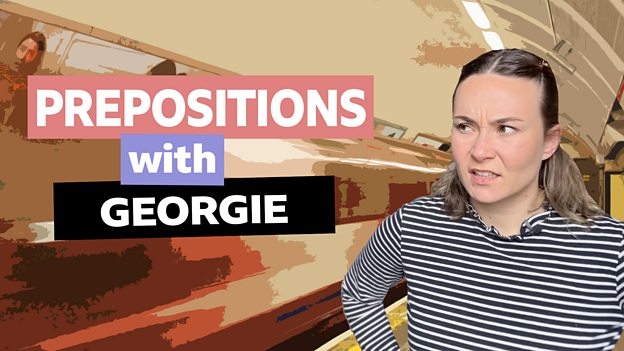6 Minute English
Intermediate level
Food shortages
Episode 230518 / 18 May 2023

____________________________________________________________________________
Learn more about food
____________________________________________________________________________
Introduction
Do you know where the food you buy in the supermarket comes from? Will it always be available? With changes in the world economy, inflation, and the effects of climate change, is there a risk of recurring food shortages in many parts of the world? Rob and Neil talk about it and teach you vocabulary along the way.
This week's question
There’s an English expression about the dangers of not having enough food for everyone: ‘we are only nine meals away…’ but, ‘away from’ what?
a) a revolution
b) anarchy
c) famine
Listen to the programme to find out the answer.
Vocabulary
food shortage
situation where not enough food is produced
since records began
used to show the point in the past when people started keeping written accounts of events, rather than just remembering the in their heads, in order to be able to use that information in the future.
glasshouse
large greenhouse; building with glass sides used for the commercial growing of fruit and vegetables
step up (to)
start taking responsibility to act to improve a situation
biodiversity
the variety of the number and types of plants and animals that live in the Earth’s natural environment
canny
clever and quick-thinking
TRANSCRIPT
Note: This is not a word-for-word transcript.
Neil
Hello. This is 6 Minute English from BBC Learning English. I’m Neil.
Rob
And I’m Rob.
Neil
Do you know where the food on your plate comes from? Many people just assume that shops will always be ready with a cheap and plentiful supply.
Rob
But recently a lack of certain foods in the UK, a situation known as a food shortage, has left supermarket shelves empty of everyday items like eggs, tomatoes, and cucumbers. Some see these food supply problems, which were caused by unusually cold weather combined with rising energy prices, as a warning not to take a reliable supply for food for granted.
Neil
Like many countries, the UK imports much of its food from abroad, and for years has enjoyed a stable and affordable supply. But with changes in the world economy, inflation, and the effects of climate change, how much longer will this continue? In this programme, we’ll be finding out, and as usual, learning some useful, new vocabulary as well.
Rob
A reliable food supply is essential. In fact, there’s an English expression about the dangers of not having enough food for everyone: ‘we are only nine meals away…’ but, ‘away from’ what, Neil? Is it:
a) a revolution?
b) anarchy? or
c) famine?
Neil
I guess the expression goes: we’re only nine meals away from revolution.
Rob
OK. I’ll reveal the answer later on. Besides difficulties in importing food, some countries are also producing less food than they used to. In the UK, many farmers are selling their apple orchards to housing developers rather than struggle with increasing production costs. Here’s Adam Leyland, editor of The Grocer magazine, speaking with BBC Radio 4’s, The Food Programme.
Adam Leyland
The forecast is for the lowest levels of production since records began. And when you think about how much investment there has been in glasshouses and polytunnels since 1985 in a way that's transformed UK supply, quite frankly, the fact that this is what's being forecast is extraordinary.
Neil
Adam says that British food production is at its lowest since records began – a phrase used to mark the point in the past when people started writing down an account of something rather than just remembering it, so that the information could be used in the future.
Rob
Production is decreasing despite improvements in how food is grown, especially the use of glasshouses and polytunnels. A glasshouse is a large greenhouse – a building with glass sides used for the commercial growing of fruit and vegetables. A polytunnel is a similar structure but made using plastic instead of glass.
Neil
However, it’s not only Brits who are worrying about the production and supply of their food - changes are happening all around the world. When global demand for food outgrows supply, countries start competing with each other. According to Oxford University’s, Professor Charles Godfrey, an expert on the global food system, we’re now living in a less connected, less collaborative world, a world which he says is ‘de-globalising’.
Rob
Deglobalisation involves sourcing food nearer to home - domestically or from neighbouring countries. While this sounds positive, Professor Godfrey is worried that deglobalisation makes it harder to supply food to parts of the world which cannot produce enough for themselves. Here, he shares his concerns with BBC Radio 4’s, The Food Programme.
Prof Sir Charles Godfrey
We think that in the next 30 or 40 years we will probably see global demand for food rising 30 to 50 percent, and I think a question is: should the UK be stepping up to help meet that demand, given that we have a very sophisticated home agriculture… or you could argue completely the opposite, that we live in a country where we are very depauperate for biodiversity - perhaps we should produce less food here and use our land more for biodiversity. My view is that if we plan our land use in a canny way, one can produce more food, and one can increase the biodiversity in the country.
Neil
Professor Godfrey thinks only a globalised food system can successfully feed the world population. Countries that can produce food should be stepping up to meet demand. If you step up to a situation, you start taking responsibility for doing something to improve things.
Rob
We need a balance between growing food and maintaining the Earth’s biodiversity – the number and variety of plants and animals living on earth. Depending on their circumstances, countries could use their land either to grow food or to promote biodiversity, but Professor Godfrey thinks both are possible if we are canny – an adjective meaning clever and quick-thinking.
Neil
Feeding the world is an urgent global challenge with serious consequence, as mentioned in that English expression, so… maybe it’s time you revealed the answer to your question, Rob.
Rob
Yes. I asked you to finish the saying, ‘We’re only nine meals away from…’.
Neil
And I guessed it was ‘nine meals away from revolution’?
Rob
Which was the wrong answer, I’m afraid. Actually, the saying goes ‘we’re only nine meals away from anarchy’. I really hope not, but just in case let’s recap the vocabulary we’ve learned starting with food shortage – a situation where not enough food is produced.
Neil
The phrase, since records began shows the point in the past when people started keeping written accounts of events, rather than just remembering them.
Rob
A glasshouse is alarge greenhouse – that’s a building with glass sides used for growing food.
Neil
If you step up to a situation, you start taking responsibility to act to improve things.
Rob
Earth’s biodiversity is the variety of plants and animals living in the natural environment.
Neil
And finally, the adjective canny means clever and quick-thinking. Once again, our six minutes are up. Goodbye for now!
Rob
Bye bye!
Latest 6 Minute English
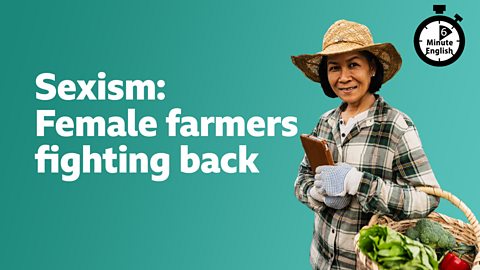
Sexism: Female farmers fighting back
Episode 231228 / 28 Dec 2023
How can female farmers beat rural sexism?
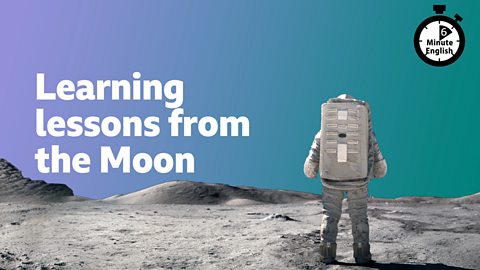


Invasive species: Why don't we eat them?
Episode 231207 / 07 Dec 2023
Could we eat invasive species?

What and where is Little Italy?
Episode 231130 / 30 Nov 2023
Mozzarella, ricotta, cannolis and focaccia... Where are we? Little Italy of course!

Social media and teenage health
Episode 231123 / 23 Nov 2023
What are the health risks of social media for teenagers?

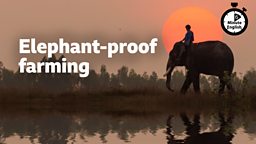



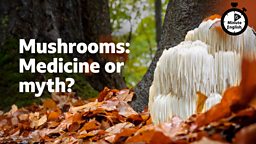


Sounds that make you want to scream
Episode 230928 / 28 Sep 2023
Are there any sounds you find upsetting?


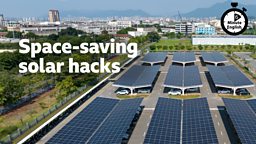

The stories behind our names
Episode 230831 / 31 Aug 2023
What do our names reveal about our culture and family history?


Are you unhappy at work?
Episode 230817 / 17 Aug 2023
Does work leave you feeling bored and exhausted?



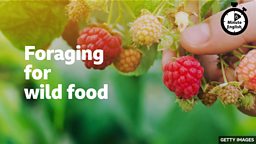



Is it wrong to eat plants?
Episode 230629 / 29 Jun 2023
Should we treat plants with the same consideration we treat animals with?



The art of subtitling
Episode 230608 / 08 Jun 2023
Hear how subtitles can help bring TV and movies to life

Ecotourism: good or bad?
Episode 230601 / 01 Jun 2023
We discuss the growing popularity of ecotourism.
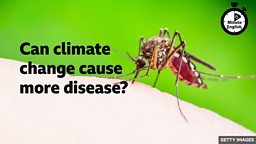
Can climate change cause more disease?
Episode 230525 / 25 May 2023
With warming temperatures, mosquitos are now spreading to new areas, including Europe.
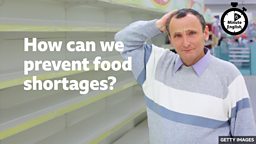


Ice and the origins of life on Earth
Episode 230504 / 04 May 2023
We talk about an essential element for life to thrive.

Women in politics
Episode 230427 / 12 Apr 2023
We discuss some of the reasons why women make up only 26% of the world's politicians.

What's the point of museums?
Episode 230420 / 20 Apr 2023
We discuss the role of museums in the 21st century and the items taken from different countries.

How culture affects sadness
Episode 230413 / 11 Apr 2023
What ways do you think culture can influence sadness?

Would you eat a Kalette?
Episode 230406 / 06 Apr 2023
Hear about a new kind of vegetable making an entrance in British kitchens

Do you get jealous easily?
Episode 230330 / 06 Mar 2023
Let's talk about the ugly green-eyed monster


Food and mood
Episode 230316 / 16 Mar 2023
We look at the link between what you eat and how you feel.

How to talk to a climate denier
Episode 230309 / 09 Mar 2023
The dos and don'ts of trying to discuss science with someone who doesn't believe in it

Losing your mother tongue
Episode 230302 / 02 Mar 2023
Hear the story of a woman who replaced her native Czech for English.
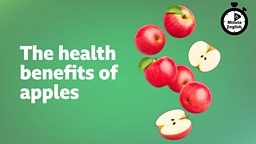
The health benefits of apples
Episode 230223 / 23 Feb 2023
Could 'an apple a day keep the doctor away'?


Doomscrolling: Why do we do it?
Episode 230209 / 27 Jan 2023
What is doomscrolling and why are we attracted to bad news? Listen to find out!

Exercise for the lazy
Episode 230202 / 22 Jan 2023
What's the least amount of exercise you should do to stay healthy?

Can AI have a mind of its own?
Episode 230126 / 26 Jan 2023
Hear about the software engineer who became 'friends' with his computer
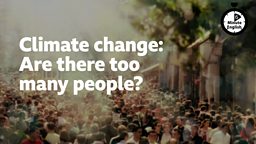
Climate change: Are there too many people?
Episode 230119 / 13 Jan 2023
Does the size of your carbon footprint depend on where in the world you were born? Listen to find out!
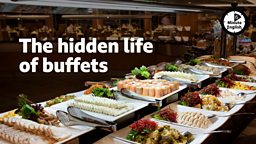
The hidden life of buffets
Episode 230112 / 12 Jan 2023
Neil and Sam discuss buffet meals and the history behind them.

Songwriting
Episode 230105 / 05 Jan 2023
Writing a memorable song isn't easy. So is there an art to good songwriting?






